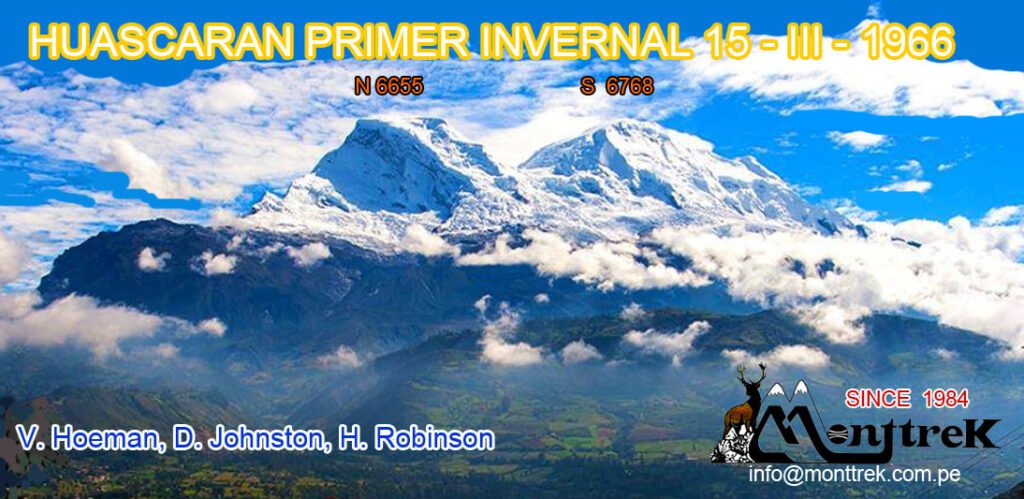On March 15, 1966, mountaineers V. Hoeman, D. Johnston and H. Robinson crowned the southern summit of the snow-capped Huascaran (6768 meters) by the normal route, with strong and icy winds, they only had sections of loose snow. According to our research, it has been the only winter expedition in the history of Peruvian mountaineering.
FIRST ASCENT TO THE SOUTH TOP
On July 20, 1932, the expedition of the Austro-German Alpine Club, led by Dr. Phillip Borchers, managed for the first time to reach the summit of the southern peak with 6768 m asl (height at that time). This expedition was made up of the German mountaineers Philipp Borchers, Wilhelm Bernard, Erwin Hein, Hermann Hoerlin, Erwin Schneider, and the Peruvians from Yungay Néstor Montes and Faustino Rojo.
Looking back from where we were, we saw with no small surprise that two men were following us on the climb: they were Néstor Montes and Faustino Rojo, the two most skilled boys we had, who, handling the taut rope to perfection, made a kind of particular ascent” and Eng. E. Hein exclaimed “These men were born mountaineers.”
FIRST ASCENT TO THE NORTH TOP
It was on September 2, 1908 by the American climber Annie Smith Peck in the company of two Swiss Guides, R. Taugwalder, G. Zumtaugwald and two porters from the town of Yungay.
Before reaching the summit, they made four ascension attempts in July 1906 without reaching the summit; They continue between the months of June to August 1907 and also fail.
Just one year later, on September 2, 1908, Annie Peck claimed to have reached the northern summit of Huascarán at 6,655 m asl, although there are still shared opinions about whether she had reached it or not. Later she claimed that she had surpassed the world altitude record for women.
The ancient name of the Huascaran was MATASHRAJU (MATAKSHU), it comes from the Ancash Quechua word MATASH, which means TWINS and RAJU (RAHU) means glacier, snowy or ice. Therefore it was called snowy twins or equals.
First promotions of Latinos.
– On August 3, 1953, the Peruvian expedition made up of Félix Mautino, the brothers Guido, Pedro and Apolonio Yánac and Macario Ángeles, achieved the southern summit. The following year, the same members of that expedition reached the summit of the Argentine Aconcagua massif, the roof of America.
– On July 8, 1953, E. San Vicente and M. Villavicencio ascended the southern summit for the first time in the first Mexican expedition. On August 3, 1973, the second Mexican expedition made up of Raúl Bárcena, Guillermo Díaz, Antonio Carmona and Vicente Hinojosa achieved the ascent for the first time to the northern summit via the normal route or 'The Throat'.
CASAROTTO SOLITAIRE
In 1971 the first route was opened to the middle of the north face of the north peak, by the Italian mountaineer Renato Casarotto alone, being a very exposed route; He left base camp on June 6, 1977, remaining on the wall for 17 days, carrying around 40 kg of material and food, climbing each section three times (two uphill and one downhill) due to the special self-belay technique. adopted by himself. At 4:30 p.m. on June 21, 1977, the Italian climber reached the summit; It took another two days to return to the base camp from the west side.
In 1993, Battistino Bonali and Giandomenico Ducoli, two mountaineers and friends of Father Ugo de Censi, attempted to climb the north face of Huascarán, along the still unrepeated Via Casarotto with the slogan “Climbing high to help those below”. On August 8, 1993, when they were 200 meters from the summit and were resting, they were swept away by an avalanche that killed them and threw their bodies 1,300 meters downhill.
Slovenian road
Among the most important paths that were opened in the mountain in more recent years, is the one that was opened in two days, alone, by the Slovenian Pavle Kozjek on the south wall of Huascarán Sur in 1991 and its ridge, called Pot v Pekel (Road to Hell), by the Slovenians M. Kovac, B. Lozar and T. Petac, remounted in 1993 on the northeast pillar of the same wall.

– Author: Porfirio Cacha –